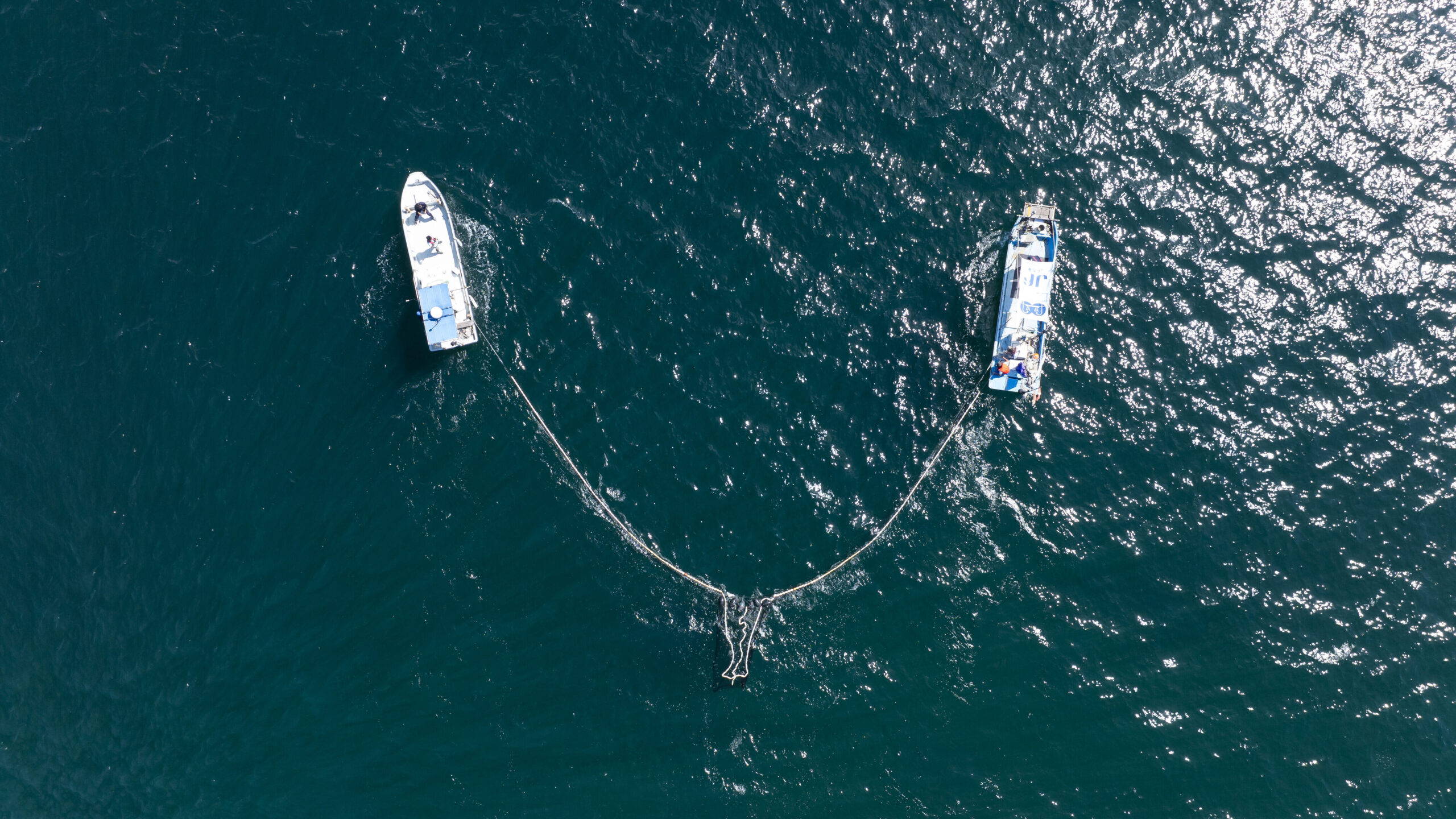Challenge of Developing Marine Debris Collection Technology
At Clean Ocean Ensemble, a certified non-profit organization, we are dedicated to developing and testing effective technologies to collect marine debris. Our efforts span both domestic and international waters, including projects at sea and in rivers, as we take on the challenge of restoring cleaner oceans worldwide.

At Sea (Shodoshima island in Japan) | Collecting Microplastics with a Low-Cost Recovery Device
Off the eastern coast of Shodoshima Island in Kagawa Prefecture, we deployed a simple V-shaped recovery device in a known marine debris hotspot, guided by the insights of local fishermen. During a 21-day field test, the device successfully collected 71 pieces of microplastic.
Technology Used
- A V-shaped barrier made from fishing nets and floats, designed to harness natural ocean currents.
- A low-cost, energy-efficient structure built using locally sourced materials.
Results
- Collected 71 pieces of microplastic.
- Demonstrated that a stationary collection system can effectively capture even small debris floating at sea.
At Sea (Mozambique) | First International Deployment and Global Collaboration
Off the coast of Mozambique in Africa, we conducted our first international field test using an upgraded version of our recovery device. Working in partnership with local fishermen, the system was successfully deployed and collected 54.5 grams of marine plastic debris.
Technology Used
- A Japan-developed recovery device customized for local conditions, including adjustments to net depth and added weights.
- Angle adjustments and safety enhancements tailored to wave and current patterns.
Results
- Successfully completed two sea-based trials and one river-based trial in collaboration with local fishermen.
- Demonstrated the feasibility of safe and effective field testing through close cooperation with the local community.
Collaboration
- Worked closely with local fishermen to deploy and retrieve the device.
- Exploring a future handover of operations to a local NGO to ensure long-term sustainability.
River (Takamatsu in Japan) | Preventing Waste from Flowing into the Ocean with “Kawasemi 001”
In the Tsudagawa River in Takamatsu City, Kagawa Prefecture, we developed and deployed a river waste collection device called “Kawasemi 001.” In its first field test, the device successfully captured approximately 1.8 kilograms of debris, demonstrating its effectiveness in intercepting waste before it reaches the ocean.
Technology Used
- A lightweight structure combining floats and nets, designed for easy installation by a small team.
- Uses wing-like components to guide the river flow and direct debris into a collection pocket along the riverbank.
Results
- Collected approximately 1.8 kilograms of river waste, including hard plastics and cans.
Collaboration
- Conducted joint research with a local university to tailor the system to the characteristics of rivers in the Seto Inland Sea region.
- Established a funding and outreach framework through sponsorships and donations.
Six-Organization Joint Recovery Operation | Cross-Sector Collaboration in Action
In 2024, a collaborative sea trial was conducted off the coast of Shodoshima involving six organizations from academia, government, industry, and the fishing sector. Four vessels worked together to tow a large-scale recovery net. Despite strong winds, the operation successfully confirmed the collection of microplastics.
Technology Used
- An active recovery net (trawl-type) towed by vessels.
- Capable of sweeping large areas of ocean surface in a short amount of time.
Results
- Successfully captured microplastics through coordinated net towing at sea.
- Demonstrated effective collaboration and information sharing across a multi-sector team.
Collaboration
- Six organizations—including a fisheries cooperative, university, shipping company, and local businesses—participated in the operation.
- Combined scientific monitoring of marine pollution with hands-on recovery efforts.
Looking Ahead
Through these initiatives, Clean Ocean Ensemble has developed and demonstrated a low-cost, community-driven, data-connected model for marine debris recovery both in Japan and abroad. Moving forward, we aim to expand long-term deployments, enhance data utilization, and scale up the adoption of our recovery systems—continuing our mission to tackle plastic pollution across all environments, from rivers to the ocean floor.
